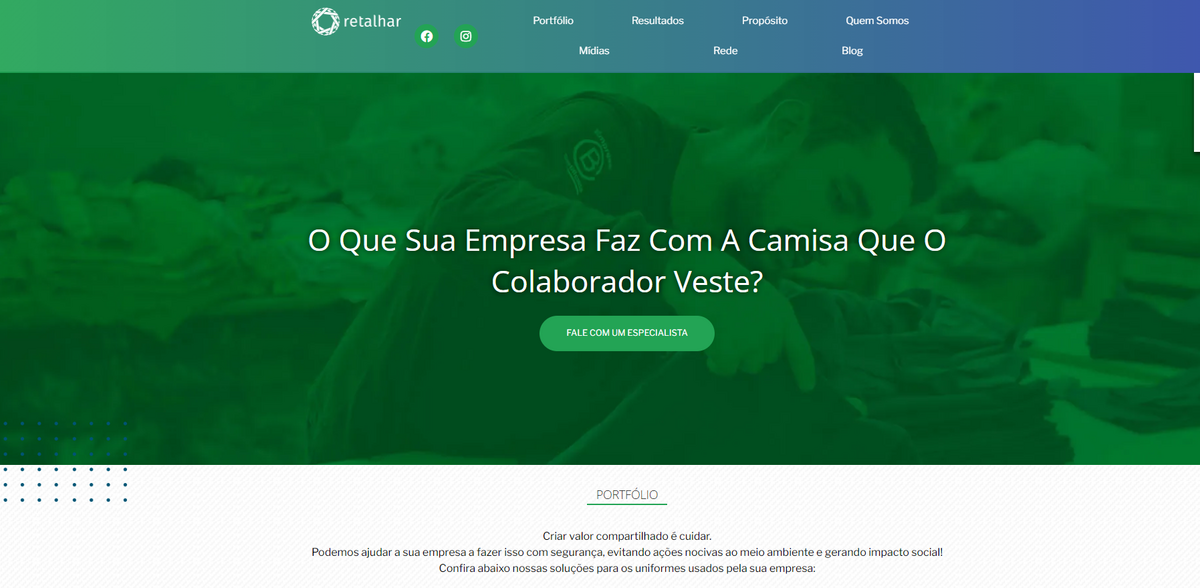What is the Project?
RETALHAR stands as a pioneer and reference in innovation in textile recycling. Responsible, innovative, and inclusive management of textile waste forms the backbone of the project. It uses the reuse of waste as a tool to value people and transforms the disposal problem into stories of success in the transition to a Circular Economy. With a history rich in experience, RETALHAR turns what many see as a challenge into an opportunity, paving the way for a fairer, circular, and inclusive economy. The textile industry, crucial for society and employing nearly 20% of the workforce in Brazil, serves over 95% of the global population. Despite producing 100 billion pieces per year and being one of the most polluting sectors, RETALHAR believes that careful reverse logistics and design innovation can shift that tide… and create new futures.
Main Benefit
Key figures and facts that highlight the main benefit include:
- Millions of pieces transformed
- Kilograms of uniforms reused
- Blankets distributed to homeless people
- Correct destination through specialized reverse logistics
- Preservation of brand security and final destination certification
Inclusive Innovation in Textile Recycling
RETALHAR’s approach is far from conventional. The project emphasizes not only the innovative reuse of textile waste but engages specialized and inclusive labor in its processes. Uniform, clothing, and fabric disposal come together with the creation of recycled blankets, circular products, and upcycling products that redefine what waste can become. The commitment to creating a positive impact is evident in every step—from the disposal to the re-signification of discards—using design and innovation to bring value into the equation. This forward-thinking methodology is recognized as a key element in the transition to a more sustainable and socially responsible economy.
Circular Economy and Reverse Logistics
At the heart of the project lies the circular platform, the largest circular fashion movement in Latin America. Through reverse logistics firmly carried out by inclusive and specialized labor, RETALHAR ensures that every piece of material is given the correct destination. This means that mismanaged waste no longer finds its way into landfills, but instead enters a cycle where every item is revalued and reused. The operational model is designed to preserve the integrity of the brand while securing a final destination certificate; a practice that absolutely elevates the standards in textile disposal management. It’s a dynamic process that speaks to innovation with a human touch… and renewed commitment.
Certification and Security
With certifications that underline its commitment to environmental, social, and governance (ESG) practices, RETALHAR distinguishes itself as a certified B Corporation. The project is not only about managing textile waste but about ensuring that the process is safe, secure, and recognizable by partners such as Leroy Merlin, FedEx, Beneficência Portuguesa, Arteris, CEA, Magalu, Reserva, and Renner. The secure handling of materials, together with the final destination certificate, reinforces that every step taken prioritizes the customer’s brand security as well as environmental sustainability. Every textiles’ journey through the system is monitored to meet high-quality standards, proving that safety and certification can go hand in hand with innovation.
People First and Community Focus
RETALHAR’s vision is strongly influenced by the idea that textile waste management can be a tool for social change. As an Impact Business, its operations not only focus on environmental impact but also on improving lives. The team, featuring Jonas Lessa (CEO and Co-founder), Lucas Corvacho (Operations Director and Co-founder), Bruna Cecilia, and Moreno Dias from the commercial division, embodies the spirit of transforming problems into opportunities. This dynamic approach is a modern-day example of merging sustainability with social responsibility, ensuring that people are at the center of innovative recycling efforts. The community is respected, and every stakeholder is valued as part of the larger mission to enhance circularity in the economy.
Project Impact
- SDG 8 – Decent Work and Economic Growth
- SDG 9 – Industry, Innovation, and Infrastructure
- SDG 11 – Sustainable Cities and Communities
- SDG 12 – Responsible Consumption and Production
- SDG 13 – Climate Action
A Legacy of Social Responsibility
The essence of RETALHAR is embedded in social responsibility and environmental stewardship. The project represents a forward-thinking mindset where textile disposal management is integrated with certification, security, and reverse logistics to create a holistic ecosystem that values both people and the planet. From transforming millions of pieces of waste to reusing countless kilograms of uniforms and distributing recycled blankets to the homeless, RETALHAR’s achievements resonate far beyond basic waste management. The success of its circular products and upcycling processes provides a solid foundation for future initiatives driven by sustainability, innovation, and inclusion. With a mix of responsible tactics, dynamic labor practices, and tangible benefits, RETALHAR leaves behind a legacy that reinforces the importance of transforming waste into wealth – a true testament to human ingenuity and the potential for change… The revolution in textile recycling continues to inspire communities, industries, and policymakers to follow suit.


















